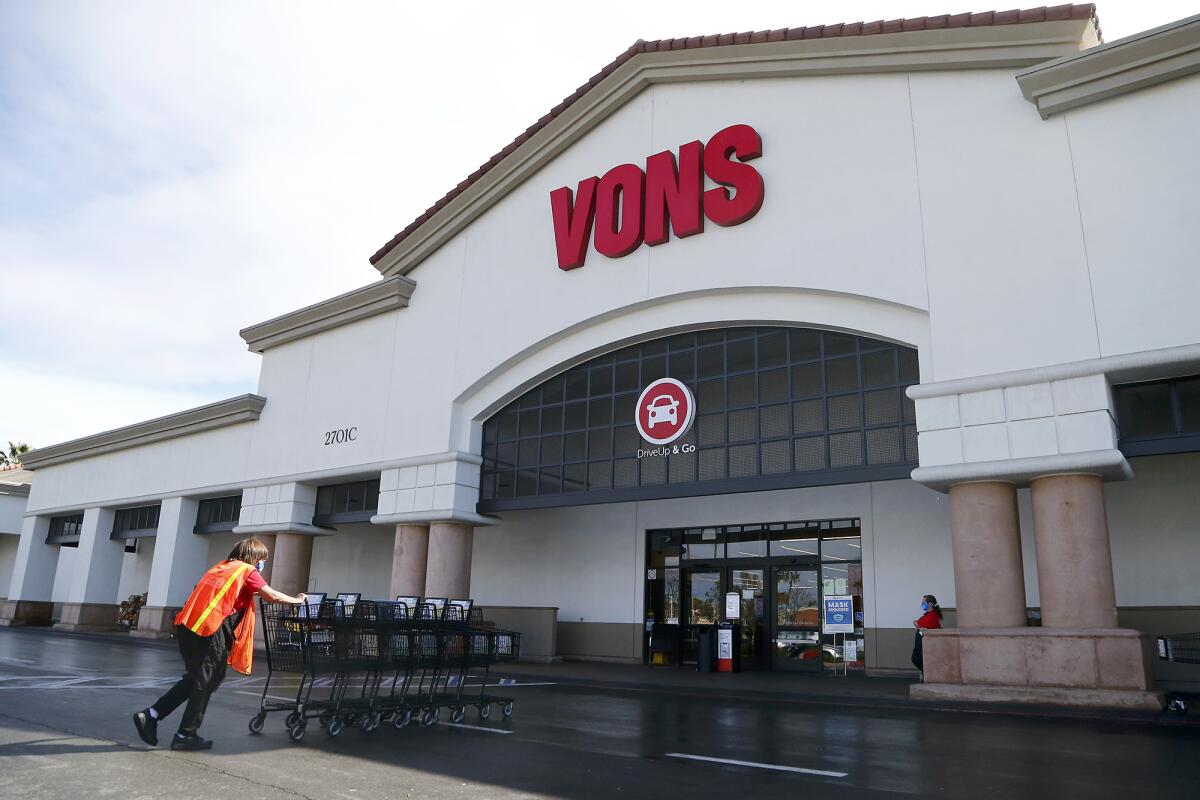Costa Mesa council will draft urgency measure to provide $4 hourly ‘hero pay’ for grocery workers

Costa Mesa grocery employees could soon see bigger paychecks, after the City Council decided Tuesday to explore an ordinance requiring certain companies to provide an additional $4 per hour in hazard pay to frontline workers during the coronavirus pandemic.
If passed, the regulation would offer 120 days of additional pay to grocery workers who say they’ve faced increased risk of exposure interacting with the masked and unmasked public as essential workers in the past year.
It would also align Costa Mesa with other cities that have recently adopted “hero pay” ordinances, including Irvine, Long Beach, Los Angeles and Santa Ana, the last of which approved a similar measure in a 5-2 vote Tuesday night.
City Atty. Kim Barlow acknowledged the California Grocers Assn. and other corporations have legally challenged the provisions and have sought injunctions to halt pay increases but have so far been overruled.
“The cities that have done this and have been sued have successfully fought them off so far,” Barlow said. “[But], again, none of those cases have come to final adjudication at this point.”
Council members asked questions about the size and scope of the ordinance and heard from nearly two dozen commenters, many Costa Mesa store workers who shared stories of contracting the virus and having to recuperate without full pay or covering for sick coworkers while fearing for the health of their own family members.
Nora Whittington, who’s worked for Vons for 15 years, described a stressful work environment, where employees who fall sick and have to isolate at home often do not receive full pay for missed time.
“Those of us who are left behind are dealing with customers on a daily basis who refuse to wear their masks and dealing with managers who allows the customers to continue shopping because there is fear of the customers calling corporate,” she said. “It has taken a physical and emotional toll.”
Matt Bell, secretary-treasurer for the United Food and Commercial Workers UFCW local 324, said about 14% of the Costa Mesa grocery workers represented by the union have contracted the coronavirus, while another 16% of drugstore workers in town have become infected.
Meanwhile, he said, corporations have raked in record profits since the coronavirus began — Ralphs has reportedly seen sales increase 24%, while Vons stores reported 33% gains in the past year.
“It’s not like these companies do not have the ability to pay for it,” Ball said of the hazard pay. “They’ve reaped huge profits, and it’s time for them to pay the money that these workers absolutely deserve.”
Other commenters, however, opposed the ordinance and the council’s interference with free enterprise.
“Is the role of a city council to mandate, to give an edict to, a private business to give employee raises?” said Wendy Leece, who served on the council from 2006 to 2014. “I have great empathy for these workers, but they have unions and should be going to their union bosses and negotiating hazard pay.”
That sentiment resonated with Councilman Don Harper, who said it isn’t appropriate for local government to tell businesses how to pay their employees. He also questioned why the council seemed so keen on assisting only one group of workers.
“I feel like there are council members who are catering to unions, who’ve collected money from unions. Because you’re not trying to support the waitress and waiter that you put out of business for months and months, who begged to go back to work,” he said. “I just don’t have respect for the direction this is heading, and I don’t think this is worthy of staff time.”
Councilwoman Arlis Reynolds, however, said she believes it is within the council’s purview to align business practices with the city’s priorities and values. She likens it to creating design and building standards applicants must abide by to conduct business in the city.
“Many of those rules are designed to reflect what we want to see in Costa Mesa,” she said. “In a pandemic, being a city that says to its business, we want businesses that take care of our residents is a place I’d like to be. Because of that, I do think it’s worth looking into this further.”
In a 6-1 vote, with Harper opposed, the council instructed city staff to return with a draft ordinance at a future meeting.
All the latest on Orange County from Orange County.
Get our free TimesOC newsletter.
You may occasionally receive promotional content from the Daily Pilot.




